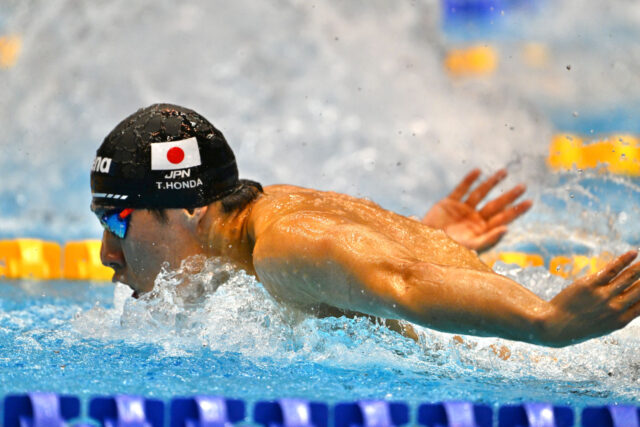By Riley Overend on SwimSwam

Gazing across the frozen Lake Weissensee last month in the Australian Alps, two-time Olympic silver medalist Markus Rogan prepared to swim the length of a football field under ice with one question dominating his thoughts.
Why the f**k am I doing this? Do I really need this?
Rogan, now a licensed psychotherapist in Los Angeles, searched inward for an answer as he walked the 111.2-meter route — a distance chosen in honor of his son’s birthday on November 12.
“The reason I keep coming up with is there’s this thing that we as men have where at some point as a little boy we’re told to man up and put on this armor,” said Rogan, a 41-year-old Stanford graduate from Vienna, Austria. “Why do you think I went to the Olympics? Why do you think I became a doctor? Because I’m so secure in myself? No — I needed a lot of external validation to feel good about myself.
“We put on so much armor all the time,” he told SwimSwam. “Why do we buy nice cars and do all these things if not to finally feel good about ourselves? What happens in these long breath holds and these long, edge-of-life experiences is for a brief moment afterwards you get to take the armor off and be that good-enough little boy. And that just feels so good, to be able to cry in my friend’s arms afterwards and just thank him for being alive. You feel like, wow, it’s really just about this beautiful breath. The first breath you take when you come up is the first breath of the rest of your life.”
Adding to the risk was Rogan’s decision to forego a safety rope to maximize the glide on his stroke, though he did have a team of world record free divers in scuba gear supervising his attempt. He said the last 30 meters felt like swimming in peanut butter because the blood from his hands and arms withdrew to protect his lungs and heart. “If you had seen me at 90 meters and asked me, ‘What’s 5+3?’, I would not have been able to give you an answer,” Rogan said.
After almost a minute and a half under the frozen lake, Rogan emerged conscious and triumphant as the new world record holder for longest swim under ice without fins or a wetsuit — 19 years after he first broke the world record in the SCM 200 backstroke back in 2005. The global standard for longest swim under ice without fins or a diving suit was only 80.99 meters until Swiss free diver Peter Colat went 106.25 meters last February.
Rogan credited 84-year-old entertainment lawyer Michael Donaldson as his inspiration throughout training. He spent this past winter watching Donaldson swim three lengths of his unheated 25-yard pool without coming up for a breath and hearing him quote Socrates: “It is a shame for a man to grow old without seeing the beauty and strength of which his body is capable.” Last month, Donaldson broke four ice swimming world records in a new senior category created by Guinness World Records.
Rogan wishes he would have taken ice swimming more seriously during his professional career because of the benefits for his breath work. He can now hold his breath for six minutes thanks to a bit of training, almost double the 3 ½ minutes he could muster at his athletic peak.
“I really encourage all professional swimmers to take a serious look at what breath work can do for them,” Rogan said. “If you do it with proper supervision, I think you can really discover what your mind is capable of; it’s much more than you think. There’s no reason any swimmer should ever come up before 15 meters on any race.”
In his private practice, Rogan also recommends cold water exposure for his non-swimming clients to help them recognize that reactions — even panic — are closer to active choices than we think.
“In general, the big thing is that most of us live our life always having to react to something,” Rogan said. “There’s a text message, there’s some requirements, the kids want something, the wife wants something, the mom wants something. We’re constantly running around reacting. And that, clinically, demands the sympathetic nervous system to be hyperactive. We end up just running around most of the time doing something that we have to do — or that we tell ourselves we have to do. So we are conditioned, more or less, that there are all these things that we have to do and all these conditions that we have to react to. One of these conditions that we automatically assume is that when you jump into ice, you’re going to be short of breath, you’re going to be freezing cold, and you’re going to want to get out. You just assume those are givens, you never really think about or question that that reaction is a choice. Even panic is a choice.
“That’s when you realize that being in ice water doesn’t necessarily lead you to that panic breath,” he added. “You are, on some level, making a choice to panic. You can actually look at that neurologically: the cerebral cortex grows thicker. There is actual change in people who meditate. Most reactions are just actions — they are active choices. In ice swimming, you realize very quickly that you can control much, much more than you think. That’s the part that I just love. I’m a psychologist, and I put a lot of my patients in ice baths just to help them learn that lesson that panic is a choice. Then once you realize that, you realize how much choice you actually have over every single one of your stress reactions.”
SwimSwam: Olympic Medalist Markus Rogan Breaks World Record for Longest Swim Under Ice (111.2 Meters)

















You must be logged in to post a comment Login